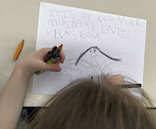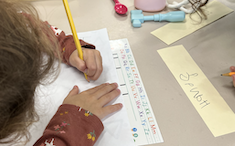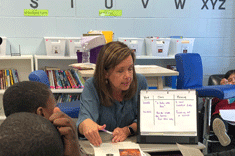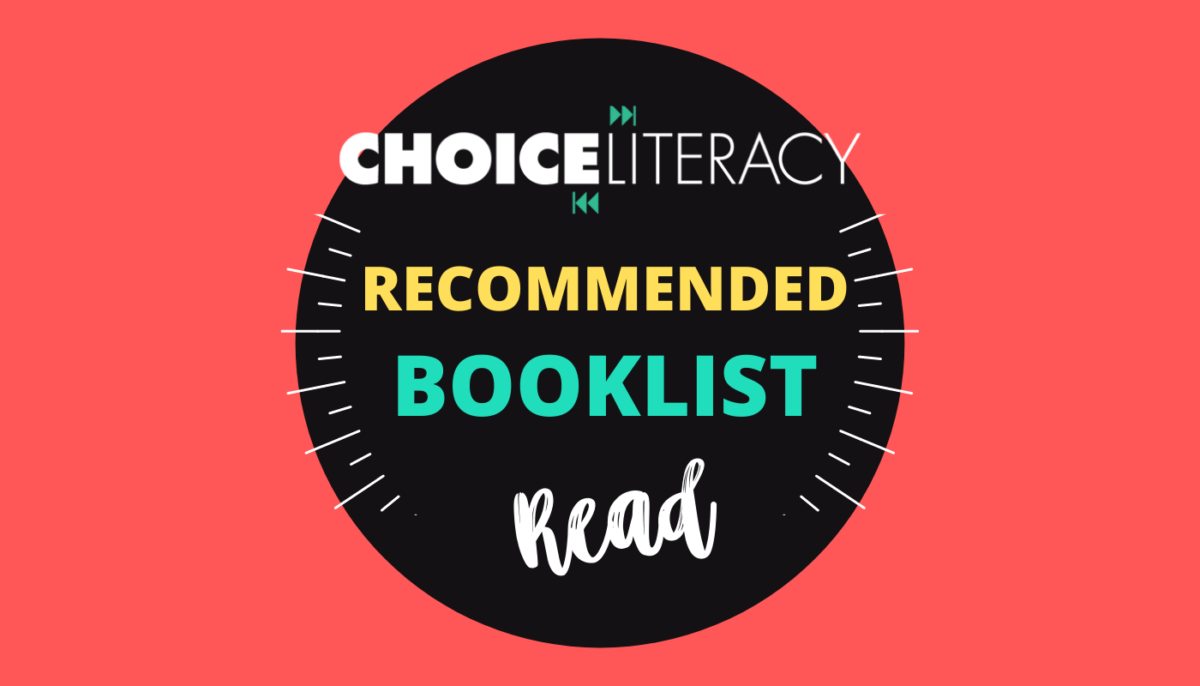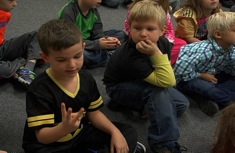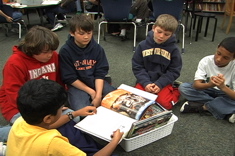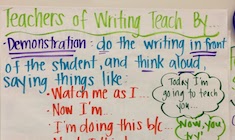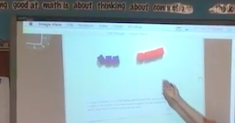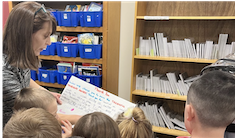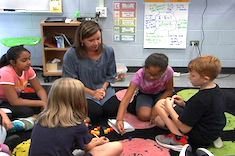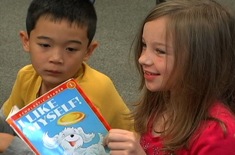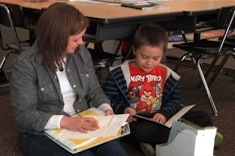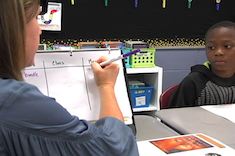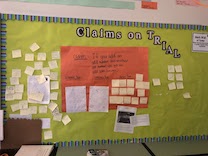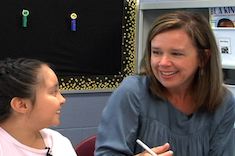3rd
Latest Content
Graphic Engagement
Joanne Emery supports students as readers and writers of graphic novels. Included is a list of resource books and websites, as well as students’ favorite graphic novels.
The Language We Use and How It Strengthens Understanding
Suzy Kaback explores the importance of the way teachers use language and invite kids to use theirs. It is the key to knowing ourselves, tuning in to others, and understanding the larger world.
Alert! Mistakes in Progress
Becca Burk gives the science behind mistakes and growth, and offers suggestions on ways to use mistakes as a means to help students become critical thinkers and problem solvers.
Overcoming Challenges in Writing Workshop with Trauma-Informed Practices
Ruth Ayres shares three mindsets to help teachers prioritize connection over correction when teaching writers.
Young Author Celebrations
Jennifer Court shares the celebrations that propel students to engage in the Young Authors Program.
It’s Time to Admire: Sharing in the Beauty of Students’ Writing
Heather Fisher shares a process to help teachers learn to admire student writers and find the beauty in their work.
Five Ways to Teach Fluency
Dana Murphy reminds us of five ways to teach fluency…especially when reading seems laborious.
Six Tips to Plan a Family Literacy Night
Does planning a family literacy night seem overwhelming? Lisa Mazinas offers six tips to ensure a thoughtful and successful event.
QuickTake: Choice in Making Plans for Writing
Ruth Ayres shares the importance of giving students choice when planning their writing projects.
Centering Students’ Brilliance (Booklist)
Stella Villalba is passionate about centering the beauty, brilliance, and genius of all students in our classrooms. She shares an inclusive booklist to inspire and support other educators in doing the same.
Student-Generated Questions to Promote Problem Solving and Modeling with Mathematics
Mallory Messenger shares a process for students to engage and solve a type of intriguing question called Fermi Questions.
Turn and Talk, Then What?
Vivian Chen offers useful tips for seasoned and new teachers when it comes to helping students engage in a turn-and-talk.
Three Ways Student Writers Taught Me How to Use Writing Partnerships
Patty McGee pays attention to how students work as writers to find the teaching points for how to learn to work as writing partners.
Teaching Students to Be Teachers
Tara Barnett and Kate Mills share a process for empowering students to be teachers in partnerships and small-group instruction.
Choral Counting Routine
Mallory Messenger shares ways choral counting provides an opportunity for students to share ideas orally, process language and numbers, and bring out vocabulary within the context of looking for patterns.
Level Two Unlocked: Using the Language of Video Games to Engage Students in the Assessment Experience
Heather Fisher considers the research behind gamified experiences and applies it to a lengthy first-grade phonics assessment. Heather challenges us to gamify assessments to maintain the integrity of the assessment while increasing student engagement.
Helping Writers Self-Correct
What to do with writers who catch errors in isolation but not in their own writing? Cathy Mere suggests three ways to help students self-correct their writing.
Do the Hard Thing
Becca Burk reminds all of us that one of the important parts of being a teacher is helping students believe they are capable. Becca shares three practical ways to uplift student capability.
Moving Beyond Asking Questions
Dana Murphy comes to a lesson about asking questions in a curriculum resource and realizes it is not what her students need. She has designed a lesson to make asking questions more meaningful and useful for her students.
Identifying Story Elements
Dana Murphy shares a whole-class conversation about identifying the climax of the plot. She reminds us that defining story elements is not always clear-cut.
Read Aloud Magic
Jen Court reminds us of the power of reading aloud to students and pushes us to remember the importance of planning to use books to engage students and hone teaching points.
Conferring Notebook Details
Bitsy Parks opens her conferring notebook and shares powerful ways to use conferring notes to differentiate instruction for students in reading and writing.
Still Thinking: An Opportunity to Pause and Think Deeply
Jodie Bailey provides a structure to give students more time to think through ideas and problems. By using this practice, students gain ownership of their learning.
The Power of an Anchor Chart in a Digital World
Dana Murphy reminds us of the power of an anchor chart in a digital world.
Getting to Know Digital Learners: How Playing with Technology Helps Facilitate Our Identities as Learners
As teachers we do many things to get to know our students as readers and writers and mathematicians. Josie Stewart and Hannah Tills lead us to consider how to get to know our students as digital learners.
Listening for Conjectures
Mallory Messenger shares a routine for hearing student conjectures (in math and other subjects) and a process for giving time for the class to prove or disprove the claims. Download a Conjecture—Prove or Disprove Recording Sheet to collect student conjectures in your classroom.
Student Voices First
David Pittman offers practical ways to place student voices first in classrooms in order for their passions, interests, and identities to influence our teaching.
Math Debates: A Powerful Sense-Making Routine
Jodie Bailey shares a powerful practice of math debates for students to explore a problem with discussion and evidence to discover the correct solution.
Engaging Kids in Reading Intervention
Dana Murphy shares ways to make reading intervention a high-interest time for students.
Building a Classroom Library with Students (and Navigating the Tricky Parts)
Tammy Mulligan leads us through the process of giving primary students the reins for building and organizing the classroom library . . . and offers tips for navigating the tricky parts.
Browse Content By
Type
Category
- Assessment Tools
- Big Fresh Archives
- Booklists
- Choice Numeracy
- Classroom Design
- Common Core
- Community Building
- Conferring
- Content Literacy
- Digital Literacy
- English Language Learners
- Equity
- Family Relations
- Free Samples
- Guiding Groups
- Leadership
- Literacy Coaches
- Mentor Texts
- Minilessons
- New Teacher Mentors
- Podcasts
- Poetry
- Quote Collections
- Reading Strategies
- Self Care
- Struggling and Striving Learners
- Talking and Listening
- Teacher Study Groups
- Teaching Reading
- Teaching Writing
- Word Study and Vocabulary
Author
- Melissa Quimby
- Nawal Qarooni
- Gwen Blumberg
- Julie Cox
- The Lead Learners
- Hannah Tills
- Josie Stewart
- Ruth Metcalfe
- Mallory Messenger
- Becca Burk
- Jodie Bailey
- Vivian Chen
- Mary Brower
- Tiffany Abbott Fuller
- Stephanie Affinito
- Ruth Ayres
- Leigh Anne Eck
- Heather Fisher
- Shari Frost
- Julie Johnson
- Suzy Kaback
- Gigi McAllister
- Shirl McPhillips
- Melanie Meehan
- Cathy Mere
- Debbie Miller
- Tara Barnett and Kate Mills
- Tammy Mulligan
- Dana Murphy
- Bitsy Parks
- David Pittman
- Brenda Power
- Heather Rader
- Matt Renwick
- Mandy Robek
- Christy Rush-Levine
- Gretchen Schroeder
- Jen Schwanke
- Brian Sepe
- Katherine Sokolowski
- Stella Villalba
- Jennifer Vincent
Grade Level
Choice Literacy Membership
Articles
Get full access to all Choice Literacy article content
Videos
Get full access to all Choice Literacy video content
Courses
Access Choice Literacy course curriculum and training



